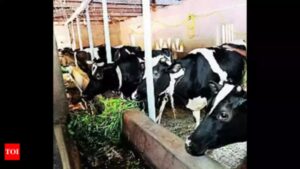
fresh milk in can, bottle and glass isolated on white
In a recent development, renowned dairy cooperative Amul is set to take over Chittoor Dairy, in accordance with a Memorandum of Understanding signed with the State government. Chittoor Dairy, once a successful unit under Vijaya Dairy in the State, faced a decline and eventually became inactive in 2002, partially due to the emergence of private dairies in the district, some allegedly supported by political rivals of the ruling party in Andhra Pradesh.
The decision to revive Chittoor Dairy through Amul’s takeover comes as a welcome step for the dairy industry. However, it also highlights a critical flaw in the cooperative movement – the lack of awareness among dairy farmers that they are not merely customers but owners of these cooperatives. This has led to the downfall of many dairy cooperatives, as farmers were enticed by short-term gains offered by private dairies, without realizing the long-term benefits of being part of a cooperative.
During a field study conducted in the district in 2004, farmers themselves admitted to playing a role in the decline of Chittoor Dairy. Tempted by slightly higher payments from private dairies and the promise of quicker remuneration, they abandoned the cooperative. However, they soon faced the consequences of their decision, receiving lower payments for substandard milk and missing the valuable services that had previously supported their livestock.
To ensure the success of dairy cooperatives, it is crucial to address this issue and educate members about the long-term value of remaining united. The cooperative model, with its member-focused approach, is ideally suited for dairy producers, as demonstrated by the success of Hatsun Agro Products (Arokya milk). Cooperatives must emphasize efficiency in services, while farmers expect stability and quality supply from the dairy units.
Amul’s takeover of Chittoor Dairy, backed by its strong global brand reputation, should not be met with objections. Rather, it should be seen as an opportunity to revitalize the cooperative after two decades of inactivity. Objecting to Amul, which operates as a cooperative, may not be in the best interests of the farmers. What dairy farmers truly need is a robust and well-organized body that can effectively compete with private dairies.
In conclusion, Amul’s involvement in rejuvenating Chittoor Dairy represents a positive step towards strengthening dairy cooperatives. However, it is imperative to address the core issue of member awareness to prevent similar declines in the future. By educating dairy farmers about the benefits of being part of a cooperative and highlighting the long-term value it offers, cooperatives can emerge as winners in the competitive dairy industry. This endeavor will not only safeguard the interests of dairy farmers but also contribute to the growth and sustainability of the dairy sector as a whole.



